|
loneliness
When I awoke a thin and shrill pain in the midst of my chest made itself felt. Not a pain of the flesh, a rustling but sharp feeling of ungauged lack that went in waves. It couldn't be denied though at first my mind tried its best with a cavalcade of musings and images and endeavours for a solution. Just to feel it and embrace it, my God...
At the bottom is such an immense protest, such an urgent demand that it stops immediately!
But this place, half way my heart and my solar plexus, wants to sing its shrill song, never ending throughout my life as it seems now.
M., come and save me! are repeating words interwoven in the texture of its subtle adagio. But all my friends and other felow men are busy being absorbed in their own play of life.
I feel so utterly abandoned.
Outside a clear blue sky is extended above a sunny day, ready to receive playing and relaxing people.
Yesterday Ben married officially his Gudrun at the town hall.
As a counterpoint to my story of loneliness I include below a picture of happy Ben and Gudrun and his little Yara on the landing of the town hall. June 18
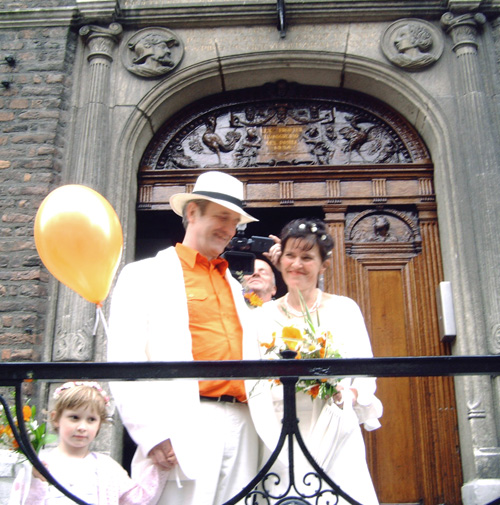
May 16 '05
Survey of a week with illustrations
(names and some details have been changed with a view to privacy)
Sunday 8th. In the morning we had our bible discussion group at my place. From all corners of the province of Gelderland came the participants to the town of Nimway, where I live in a sturdy 50 year old twelve store apartment building. Anna brought a bouquet of lilies-of-the-vally out of her garden, Cilly brought fresh dates and we sat all six at my table to take a closer look at the deeper meaning of the first two chapters of Genesis. A hot item is of course the relation of man and woman, Adams rib, or is it instead of rib "side", some bible scholars translate it thus, which places Eve in a more equal position; the two men in our group, me and Edward, are not very machismo-disposed and we agree that Genesis, though composed in a patriarchical society, doesn't preclude man-woman equality and later Edward mailed about the latest scientific insight: Not the woman originates from Adam's rib but the man originates from a chromosome of Eve.
On the way home Lisa phoned me: I 'm involved in a crash!
I jumped in my car and drove to the place of the accident.
Fortunately Lisa was not hurt, but her small car, a Fiat from 1991 - in Holland nicknamed "biscuit tin" - was badly damaged at the front, total loss.
There the car was, part of a multiple collision on one of the main roads in Nimway, it was the last in the chain, and there we were, the police, the other paticipants of the crash and Lisa, upset, under a grey sky, the drizzle pouring down on us on this chilly sunday. After all the formalities I brought Lisa home and we thought about a solution of finding a replacement for her car.
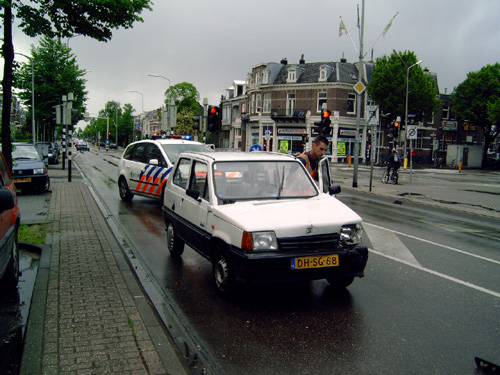
In the evening another group session took place in my home, the Jewell Path group. The followers the Jewell path try to to understand the structure of personality on a deeper level and to loosen the bonds of the ego to reach subtle inner energetic layers, which are to be found in the free domain of the soul. The ultimate goal is living an engaged and enlightened life. What we do is report to each other on our experiences in this process and to do so called 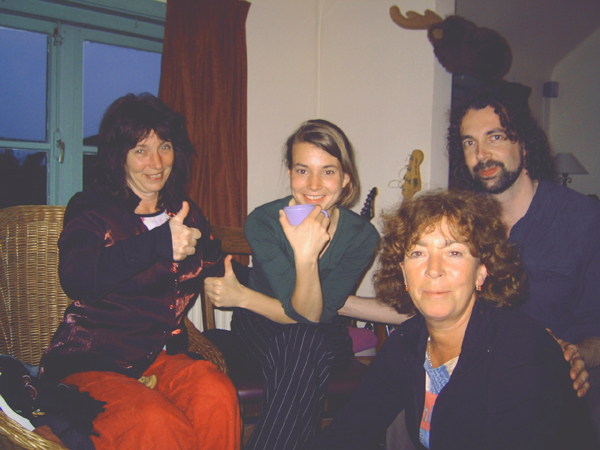 'inquiries' in pairs or triads, inquiry being a kind of intense meditation, during which experiences may be communicated to the other. This serious description of the process doesn't mean the evening was a silent and solemn happening. It was of a lively and sometimes touching gathering. 'inquiries' in pairs or triads, inquiry being a kind of intense meditation, during which experiences may be communicated to the other. This serious description of the process doesn't mean the evening was a silent and solemn happening. It was of a lively and sometimes touching gathering.
monday ninth: afternoon a massage by master masseuse Harriet in the village of Bolsterhout on the other side of the river. Sshe runs her massage business in a small room on the second store of the house with its marked pointed roof, 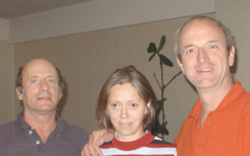 under which she has raised four children and under which her husband is trying to get accustimed to his recent retirement. In the evening I had another group session; it was a busy group week. This time it was the so called 'intervision group', that already for almost ten years convenes in the framework of a counseling training we once followed. Once there were more of us, but now we are three but very true to each other we follow and discuss each others life events. under which she has raised four children and under which her husband is trying to get accustimed to his recent retirement. In the evening I had another group session; it was a busy group week. This time it was the so called 'intervision group', that already for almost ten years convenes in the framework of a counseling training we once followed. Once there were more of us, but now we are three but very true to each other we follow and discuss each others life events.
Tuesday tenth: 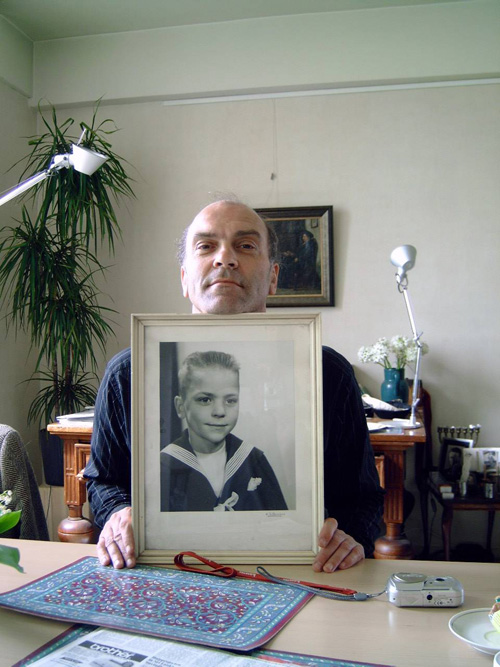
Lunch with my good friend Marcel. During our lunch we exchange news, which very often transforms in a kind of mutual counseling about our soul condition. This time Marcel brought a picture of himself as a kid. Many times our explorations center about how our daily awareness is influenced by child states we still carry in ourselves, child states which sometimes distort our perceptions but when we are able to find an inner place of unconflicted child awareness it may help a great deal to heal ourselves.
In the evening a meeting in Amsterdam of the board for the magazine of the confessional association of which I am a member. Long talks about mainly financial affairs.
Wednesday eleventh: The day after I was again in Amsterdam, this time in the afternoon and now for a periodical visit to my hepatologist in the Amsterdam University hospital. The subject of our talks is my liver condition, and to free this organ from a stubborn virus I use already for more than half a year the medicines interferon and ribavirin. Want to know more about this condition, click to my special liver diary.
Thursday 12: after lunch my friend Louis passed by. We talked among other things about his developing a consultancy in education in important human values, especially in the field of child rearing.
In the evening I attended the rehearsal of the choir I sing in. More about this very special choir may be read on the website I dedicated to it.
Friday evening thirteenth I dined with Irene and we celebrated the shabbat and she had prepared delicious asparagus and we talked about our mutual families and how they survived Wotld War II or not and if so how they fared after.
Saturday fourteenth: after a long time I attended a theater play. I journeyed with my friends Minny, Cathy and Bill to Amsterdam to see the play 'The shortest century' (De kortste eeuw), produced and written by the well known Dutch theatre company Orkater. It took place in the one of the buildings of the ancient Amsterdam gas plant, which gradually is being transformed in a important cultural center with a cinema, theater etc. The play was a kind of musical theatre about a company of party participants trapped in the 293th store of a sky scraper by a second Flood. An array of characters had all kinds of archetypical encounters, interspersed with some beautiful songs, skillfully underlined with nice music by a proficient music group led by known Dutch theatrical music composer Vincent van Warmerdam. The actors were top of the bill. The surprising dénouement implied the appearance of God in the person of an electrician and a dialogue between him and the Faustian bandleader (played by Gijs Scholten van Aschat who also wrote) in the framework of Genesis.
The play was somewhat unbalanced in quality in the field of script and text, though some beautiful scenes stayed with us and a beautiful and expressive picture of Bill, Minny and Cathy, taken afterwards, is to be seen below
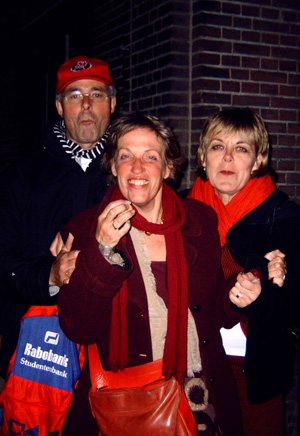
about the pope John Paul II
I explain to my cousin my attitude towards the dying pope
In World War II a Jewish father and mother in the ghetto of Lodz managed to deliver their baby in the safe hands of a childless Polish couple, who were more then willing to take care of the child. The Jewish parents gave the Polish couple an address of family in the U.S with the request to send the little boy to his American family in case they, the Jewish parents, were not to survive the war, this all to ensure the boy would get a sound Jewish education.
The child was raised by the Polish couple in their small village and the Jewish parents were murdered in the Shoah. After the war the Polish man and woman wanted to keep the child and went to their parish priest to talk about baptizing the boy to make him subject to the blessings of Christendom. When the priest heard about the request of the Jewish parents he refused and urged the Polish couple to send the boy to America.
This they eventually did. The name of the priest was Karol Wojtila, the later pope John Paul II.
When I heard this story lately, I was touched and realized that John Paul II is an honourable man with the heart on the right place, as the Dutch say.
All things considered, as far as my thoughts towards John Paul, they are ambivalent, though..
Many Dutchmen in general have their reservations towards pope John Paul II.
Not only the protestant, also many Roman Catholics were cool to John Paul II, even to the degree of disrespect, when he paid a visit to Holland during the eighties.
Partly this had to do with the great sympathy of a majority of the Catholics for pope John XXIII and his sweeping reformations during the second Vatican Council of the sixties in the direction of more liberal attitudes on many subjects, more humanistic trends, a less dogmatic stance. In Holland enthusiasm about this development was great and surpassed that in other countries. Many inspired discussion groups flourished, many new religious and spiritual initiatives of all kind came in the wake of the new spirit of change.
In this respect John Paul II reversed this development in a more conservative and orthodox direction. Many Catholics don't go with him, especially not in the field of contraception (the ban on condoms), the role of women, the strict liturgy, the celibacy of priests etc.
I sympathize with the urge many Dutch Catholics feel for a greater centrality of the human element and less rigidity in the belief system of Catholicism.
I don't feel any sympathy for the hierarchic and rigid system of the Roman Catholic Church of which the Pope is the top (with his untransparant group of cardinals). Nowhere we find such a rigid system , not in the various Protestant churches, not in Islam, not in Judaism.
During the last years I returned to Judaism as the belief which suits me best.
(read my thoughts about Jesus as Saviour and
My attitude towards Roman Catholicism is strongly influenced by the notion of its dubious, even reprehensible role versus the Jews during all ages, World War II included (read the book by the R. Catholic priest James Carroll, ‘Constantines Sword').
Pope John XXIII made a beginning in reflecting critically on this role and it must be said that John Paul II continued this self searching to the point of acknowledging much of the dark sides of the church in its fateful relations to the Jews. He almost propagated equality between
Christendom and Judaism.
As a matter of fact John Paul's best efforts have been done in the field of reconciliation of differences between the religions, especially Judaism and Islam.
The self research of the R.C. Church is by no means finished, many dark spots remain to be cleared (f.e. the politics of the Church and pope Pius XII during World War II).
Of course, from a purely human viewpoint the process of the pope's dying is moving.
It is always impressive to be witness to the deathbed of person of stature, especially when the media brings it so close by. It brings the aspect of suffering, dying and death in focus for all beholders. His being the pope transcends his human fate from an individual, private level to a general level..
But I don't experience a personal connection to Pope John Paul II; he is not my role model or identification figure. As I have tried to make clear above the past politics and the character of this powerful institution, the Roman Catholic Church, looms large over the person of the moribund pope and my attitude towards him.
I respect though his commitment towards politic and democratic reform in Eastern Europe (though not in his own Church) and his honest endeavours to better relations with Judaism.
I respect his courageous stance in the suffering of his last years and days.
May he when his hour comes rest in peace.
april 1
Post scriptum:
But also this must be envisaged: the pope made amends for " the behavior of those who in the course of history have caused these children of yours (the Jews) to suffer and, asking your forgiveness", a hugh step forward and we appreciate this by all means; but he did not ask for forgiveness fot the Institution of the Roman Catholic Church as such which would open the gate for real and lasting reconciliation.
A comment giver on Dutch TV said he couldn't do that, because in his eyes the Holy Church can't do anything wrong per definition, only some adherents. In my opininion it is regrettable it seems not possible to do this last step, as it is regrettable that this pope made steps for the canonisation of pope Pius XII, under whose Vatican windows so to say the Jews were rounded up by the Germans without his intervening.
Don't misunderstand me. I admire the pope's indispensable contribution in the liberation of Eastern Europe, his struggle against poverty and for justice. I admire his stamina and perseverance in doing this and supporting the leaders in their just aims. And in bearing the sufferings and ailings of his old age in all openness and with dignity.
"It is the Jewish tradition that in remembering the dead, we talk honestly and not just say the good things" Rabbi Michael Lerner said recently in his comment on the pope's death.
Amidst all eulogies which are flooding our screens it must be possible also to point out to negative aspects as I experience them: his conservative stance on the role of women in the church, contraception, abortion and the centralistic politics in the Church itself (f.e. in Holland he appointed very right wing conservative bishops).
april 6
Irak
Today there was on a Dutch TV discussion program a debate between two ex-generals and the ex-foreign secretary Hand van den Broek about continuation of the Dutch commitment in Irak, i.e. the presence of Dutch troops in the province of Al Mutanna.
Soon the debate slackened in a general atmosphere of a disconcerted notion: in Irak things will only be for the worse.
Also in America public opinion grows: time to retreat. Even Colin Powell has recently alluded to retiring from Irak. The shadow of a Vietnam scenario looms ever larger.
The failure of the Bush and Rumsfeld policy stares us ever more openly in the face. The cloths of emperor Bush become evermore transparent.
Let me put things in a clear perspective for a change, even if for myself; of course I am not the first to do this, but what were the reasons for the Irak invasion?
1. There was a massive amount of weapons of mass destruction. For years Irak has been searched by one searching committee after another. We may remember the ludicrous demonstration by Colin Powell at the UN (possibly he will recall it in shame) . Eventually also official American committees acknowledge: no trace of those mass destruction weapons..
2. Irak had ties with Al Qaida. This too has been demonstrated to be false. In the meantime this ghost has been materialized by the Bush policy itself. The American intervention has created its own cause: NOW these ties between Irac and Al Qaida have established themselves as a response to the Americans, the chaos and the power vacuum and recently I read in the newspapers: the center of the organisation of Al Qaida activities has moved from from Afghanistan to Irak
3. SaddamHussein was a gruesome dictator in an autocracy that suppressed and even exterminated minorities. True. But provides this – given the invalidity of the above two reasons – for sufficient justification of a military invasion?
And is this argument empowered by the consideration, that now the Iraqi people may experience the blessing of democracy?
This reasoning implies in the first place that America on its own as the police officer of the world may decide where intervention is needed en secondly that it is competent and able to impose its ideal of democracy by means of violence.
This calls on all kinds of objections in the field of global politics and international ethics.
Apart of that there is my amazement about this: the lack of any wisdom, of any strategic and philosophical insight, but also the lack of any well based historic, cultural, social psychological and political information about this part of the Middle East.
In the wake of the deep dismay, intense anger and traumatised nationalism one may understand that radical steps were considered. But that afterwards, after due lapse of time, not more reflection and realistic appraisal has taken place in the minds of the polical leaders is unforgivable.
Should the world have let Saddam alone, then?
Of course not. But there would have been so many other ways of taking measures against Saddam's regimen apart from this unilateral and radical mililary invasion. There are still so many other ways of confronting so many other cruel dictatorships prevailing still now.
I believe democracy cannot be imposed with violent means.
It is contrary to its own ideology. I think there for the development of democracy there must be groups inside the population harbouring an intense desire for democracy and a preparedness to fight for it.
Democracy – is my conviction – is the best remedy against suppression, domination of one group over another, extremism etc., but this ideal must be shared by important parts of the population and some major opinion leaders. In some parts of the world this process of democratisation needs time and wise policy and strategic insight from the democratic countries to further this process.
I can't expulse this odour from my nose:
Always the missionary fervour of the Bush camp about democracy is mixed with commercial business, affairs of money and capital, American business men visiting Baghdad and managing contracts; in brief it smells like concrete and oil.
No misunderstanding: I refer to the Bush camp, not to the Americans in general, not to all those who are doubtful and wrestling with the question, not to the opponents of the Bush policy, and certainly not to the soldiers who are doing their professional or national duty over there in circumstances of great danger and too often at the price of their life. I am also not referring to all those helpers and workers of all countries doing their best in Irak to repair the so much needed infrastructure, roads, hospitals etc.
I refer to the camp of Bush; to my regret the United States don't have the Dutch kind of democracy: in Holland the parliament may disapprove of and reject at any time the policy of the prime minister and send him and his administration away; so the prime minister and political leader may be dismissed in the midst of his term and new elections may ensue.
In the American situation we have to accept, that Bush – one of these days to be sworn in for his second term with a many million dollar festival – and his comrades have solidly established themselves in the Oval Office.
16 jan. 2005 Rob C.
December 15 the first three words
Today I spent most hours of the afternoon and evening studying Genesis chapter 1 and reading about it.
Just imagine what interesting, deep probing, mostly unanswereable but nevertheless always intriguing questions may be asked about the first words:
'In the beginning G-d created...', in Hebrew: 'Bereshit bara Elohim', three words, that evocate the most fundamental issues about how we are here, why we are here, why there is a universe, who is
G-d and does he exist in the first place, what is the state of being and what is the process of creating.
(NB: mark the word play with 'The first three seconds', remarkable popular scientific book about the Big Bang by Noble price winner Steven Weinberg)
Apart from the hebrew text and the recently published new Dutch Bible translation I reread some pages of prof. Umberto Cassuto's very thorough historically and philologically based commentary on Genesis, some texts from an English anthology from the esoteric Zohar, but also some pages about the big bang from the delightfull book of Bill Bryson 'A Theory of nearly Everything'. ( Also I use the article of R. Joseph Soloveitchik 'The Lonely man of Faith' and the commentary of Nechama Leibowitz on Genesis).
Let me mention the following remarkable view on those three creation words from the Kabbalah tradition.
The usual explanation of those first three words of the Bible is of course that G-d is the subject:
HE creates in the this mysterious beginning-moment. But it is also possible with a little bit of alternative reasoning to see "Elohim" not as the subject but as the object. And this is the way the kabbalistic interpreters of the Zohar, the most well known medieval kabbalistic text, like to view it.
They insist in respecting the Hebrew order of the three words:
Beginning create Elohim.
Who is the the subject? That is the Nothing, or the Always, the Ayn Sof ('No End'), the unspeakable not to catch in any word.
From there flows the 'Bereshit', which word is to equate with the primeval spark, and from that spark ensues the Elohim, the source from which the remaining creations are to rise.
(for those more or less knowledgeable with the Tree of Life and its components, the so called sefirot: Ayn Sof is Keter - the Crown - Bereshit is Hocmah - the spark, wisdom - , Elohim is Binah - the Palace, understanding; also for the kabbalist it is no accident Bereshit begins with the second letter of the alfabet: beth, not with the first, aleph, symbolizing the impossibility of speaking about the before. Beth means 'house' which corresponds nicely with 'palace', one of the symbols of the sefirah Binah).
Of course thorough linguistic and rational reasoning prefers the obvious logic of Elohim as the undeniable subject. No doubt my strictly logical namesake Cassuto (Umberto) would not support the kabbalistic language play, as he also refutes with sound grammatical arguments an even minor alternative interpretation of the three words by the famous medieval bible commentator
Rashi ( Rabbi Shlomo Yitzchaki).
To me the kabbalistic playful digging and playing with these words and the resulting interpretation (Which in the Jewish bible explanation tradition would count as a so called interpretation on 'Sod'(esoteric) level, unearthing the hidden meanins) appeals as much as the more current readings.
To acknowledge the Primeval Divine Ground as above and outside any human endeavour to know or to circumscribe it, what else can we do? But also to accept that a never ending Creative and Formative Principle once started to create and keeps creating the universe; and in this process created us humans with an urge to explore and to tell about Him/Her, what else can we do?
And this Creative Principle, which we are capable of admitting in some degree in our knowledge and experience,is the G-d of the first three words of Genesis, chapter one, sentence one, word three.
This entry is a small foretaste running ahead of an interactive course about the creation story from Jewish viewpoint, a course I am preparing for next year.
(I consulted the book 'Zohar', translation and introduction by Daniel Chanan Matt,Paulist Press, 1983, p. 210; the book contains only a small selection of the original Zohar.)
December 15
December 11 2004 Bernhard the movie
Yesterday I saw on TV the movie 'Faithless', directed by Liv Ullmann and scripted by Ingmar Bergman.
An aged film and theatre director (Erland Josephson) ruminates about a script he is writing and he conjures up from his past an old lover (Lena Endre) he once had an intense affair with, and in his room, looking out over the majestic Swedish coast,he imagines her telling the story of their extramarital affair.
She fell for him despite - or because - he then was a gloomy, depressive and desperate man in in an artistic crisis. She steps in his imagination and his writing room of today and recounts the past and tells about the deep hurts and the tragic consequences her step towards him, the best friend of her husband, had for her daughter and her husband.
The aged director, by letting his lover of old tell the story - and of course her tale is interspersed with many an emotional flash back - , relives his charged memories and at the same time he tries to use the upcoming material for a new script.
So we are left in doubt about what really happened and what the fantasy of the old man makes of it. And outside the framework of the film we of course on good grounds may surmise that sriptwriter Ingmar Bergman also has used one or several of his major love affairs as material for this movie.
So the movie is about looking back on an episode of passion and guilt, woven masterfully together in an intricate play between levels of memory, fantasy, subjectivity, and creativity. Especially Lena Endre does a piece of sublime acting, also the other actors perform excellently and the intent and focussed listening look on the lined face of old Erland Josephson (one of the old time film buddies of Bergman) is not easily forgotten.
Now for a jump cut to Bernhard, prince of the Netherlands today to be buried solemnly in the 'Nieuwe Kerk'in Delft, he may rest in peace. I wrote about him on my other website Caslog
in the entry of December sixth, mentioning his confessions, done to Jeroen Krabbé (according to a report of the latter in a Dutch TV program) about his frustrated love affair as an adolescent.It was an answer to Krabbé's question: what was the most important event in your life?
After seeing 'Faithless' I saw in my minds eye a movie to be made about Bernhard.
A biographer - or maybe Bernhard himself - conjuring up in his imagination some major characters of his life, the leitmotiv being that after the deep hurt of the treason by his lover he shut off the innermost part of his heart; all later adventures, war buddies, old boys friendships and love affairs being a compensation but never reaching this most intimate kernel. Of course for Jeroen Krabbe a major part in the movie is to be reserved...
Mind my words, it will not be too long and indeed a movie about Bernhard will be made, if not a musical, Bernhard The Musical, produced by Dutch theatre tycoon Joop van de Ende.
December 11 2004
December 8 A bird on Schiphol airport
Past Sunday I brought friend M. to Schiphol airport.
After a ride from Nymegen in dense fog, after an early rising at four o'clock, we arrived at Hollands main airport, source of pride and conflict.
Square kilometers of office buildings, departure halls, arrival halls,like giant glass houses brightly illuminated in the then still reigning dark of the winter morning, the control tower rearing up in the hazy sky like a cathedral tower of secular ingenuity, the whole complex surrounded by a labyrinth of supply roads and parking lots; contemporary airports, controlled giant junctions of human mobility, halls bustling with travellers intent on their important hidden destinations, moving with focussed speed or sitting in resignated waiting, old and young, persons of all colours, all walks of life, beautiful and plain, often with excited or whining children at their side and among those crowds M. and me were advancing from the parking lot to the check in desks, passing through endless halls full of commercial seductions, glistening with luxury articles, and then, eventually, after she had checked in and had gotten her boarding pass we sat down and drank coffee.
Suddenly a sparrow landed on the iron bar beside us, for the coffee café was on a kind of balcony overlooking a part of the spacious hall near the check in desks. He was the only sparrow, the only living bird around in these surroundings. That gave him such an air of extreme loneliness.
The tiny animal with his intent little brown head and his alert beady eyes was standing for a second frozen in his humble beauty, his little red claws standing out against the green bar.
For him Schiphol was an unfathomable universe in which his fortuitous quest had brought him and we were hugh mountains of potential danger though easy to avoid.
He inspected quickly and efficiently if some crumbs were to be found on our table - no, nothing - , and then he proceeded with a whimsical flight to a tall artificial christmas tree, that stood further down under our balcony, one of many installed by the Schiphol interior embellishment division.
- Lately I read the sparrows in our cities are becoming extinguished, I said
- yes, M. said, I know, where should this one live and build his nest?
- apparently in the christmas trees.
Only days later I thought again of this little sparrow when I read these lines of Polish poet Wislawa Szymborska, almost zen-like lines:
"When I see such a thing, always the certainty leaves me
that what is important
is more important than what is unimportant"
[*note]
And I decided to capture my little visitor in a few words.
To conclude my report:Two hours after having arrived at Schiphol at about a quarter past seven, I wove goodbye and M. dissappeared behind the customs to boarding on her flight to Johannesburg.
From which perspective are we all sparrows in an erratic universe?
December 8
note:
quote from (Dutch): 'Een titel hoeft niet'('Title not necessary')
Wislawa Szymborska: Einde en begin, Gedichten 1957-1997, Meulenhoff, 1999.
Internetpagina's over Wislawa Szymborska
Top
|